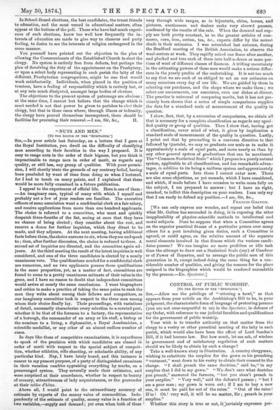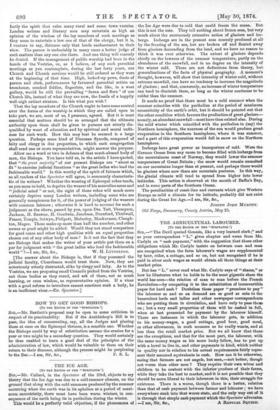CONTROL OF PUBLIC WORSHIP.
[TO THE EDITOR OF THE " SPECTATOR:1
Sin,—Allow me the privilege of " uttering a howl," as that appears from your article on the Archbishop's Bill to be, in your judgment, the characteristic form of language of protesting persons (you are not over-respectful to us) in the Spectator, in defence of my Order, with reference to our judicial faculties and qualifications for the government of public worship.
Your wish is to transfer authority on that matter from the clergy to a vestry or other parochial meeting of the laity in each parish, which would also have been the effect of Lord Sandon's Bill, if it had become law. But how much, let me ask, of wisdom in government and of satisfactory regulation of such matters should we be likely to obtain by such a change ?
Take a well-known story in illustration. A country clergyman, wishing to substitute the surplice for the gown as his preaching "vestment," went down to his vestry to obtain their consent to the change. "I shall preach the same doctrine," said he," in my surplice that I did in my gown." " We don't care what doctrine you preach," answered the farmers, "but you shan't preach in your surplice." " Very well," said the defeated parson ; " but I am a poor man ; my gown is worn out ; if I am to buy a new one, it must be paid for out of the rates." " Out of the rates ! H'm ! Oh ! very well, it will be no matter, Sir ; preach in your surplice."
Whether this story is trae or not, 1k:certainly expresses per- fectly the spirit that rules many rural and some town vestries. London writers and literary men may entertain as high an opinion of the wisdom of the lay members of such meetings as they seem to entertain a low one of that of the clergy, but it is, I venture to say, distance only that lends enchantment to their view. The parson is undeniably in many cases a better judge of such matters than any one else there. And one thing will scarcely be denied. If the management of public worship had been in the hands of the Vestries, or, as I believe, of any such parochial meetings as you contemplate, during the last forty years, our Church and Church services would be still ordered as they were at the beginning of that time. High, locked-up pews, duets of parson and clerk, performances by favoured parochial artists on trombones, cracked fiddles, flageolets, and the like, in a west gallery, would be still the prevailing "fauna and flora" of our Church life, instead of what they are now, the fossils of a happily well-nigh extinct stratum. Is this what you wish ?
That the lay members of the Church ought to have some control over the forms of the worship in which they are called upon to take part, we are, most of us, I presume, agreed. But it is most essential that matters should be so arranged that the ultimate authority upon them shall be given to persons not utterly dis- qualified by want of education and by spiritual and moral unfit- ness for such work. How this may best be secured is a large question. Perhaps some kind of Diocesan Synods, composed of laity and clergy in due proportion, to which each congregation shall send one or more representatives, might answer the purpose.
Allow me a word or two in defence of that much-abused body of men, the Bishops. You have told us, in the article I have quoted, that "the great majority" of our present Bishops are " about as fit " to exercise judicial functions " as the great ladies who lead the fashionable world." Is this worthy of the spirit of fairness which, as all readers of the Spectator will agree, is commonly characteris- tic of its writers ? Whether the wearing of Episcopal robes tends, as you seem to hold, to deprive the wearer of his masculine sense and " judicial mind " or not, the sight of those robes will much more certainly deprive many London writers, including some who are generally conspicuous for it, of the power of judging of the wearers with common fairness ; otherwise it is bard to account for such a judgment as the above, passed by you, upon Drs. Tait, Thompson, Jackson, H. Browne, H. Goodwin, Jacobson, Durnford, Thirlwall, Fraser, Temple, Selwyn, Philpott, Moberley, Mackarness, Claugh- ton, Magee. These make up more than half the number, and other names as good might be added. Would they not stand comparison for good sense and other high qualities with an equal proportion chosen out of any other body of men ? Is it not the fact that they are Bishops that makes the writer of your article put them on a par for judgment with " the great ladies who lead the fashionable world " ?—I am, Sir, &c., W. H. LYTTELTON. [The answer about the Bishops is, that if they possessed the judicial faculty, Churchmen would trust them. Now, they are notoriously utterly distrusted, alike by clergy and laity. As to the Vestries, we are proposing small Councils picked from the Vestries, not those bodies as they stand, and ask of them, not so much learning, or even wisdom, as representative opinion. If a vicar with a good reform to introduce cannot convince such a body, he is an inefficient vicar.—En. Spectator.]



































 Previous page
Previous page